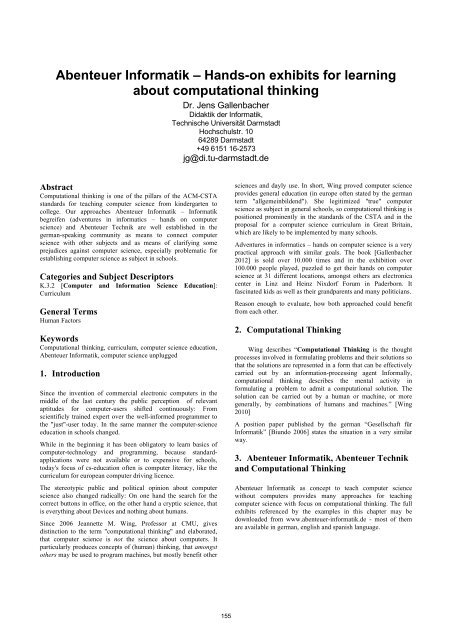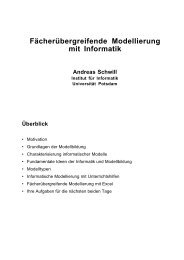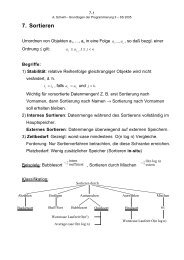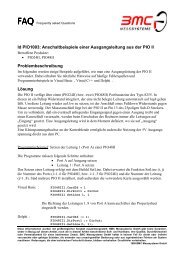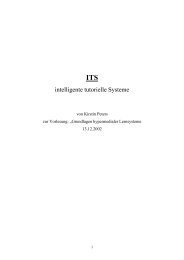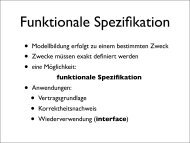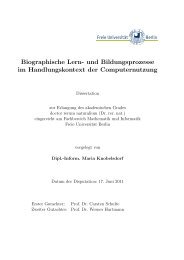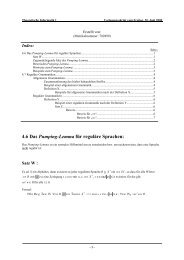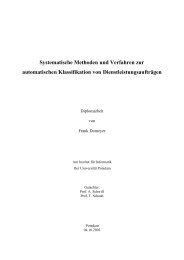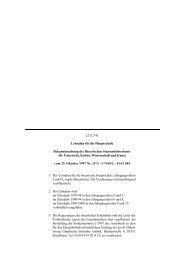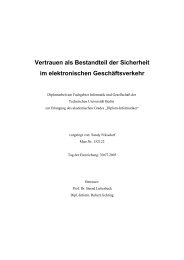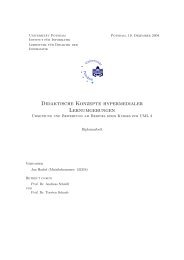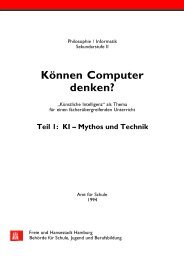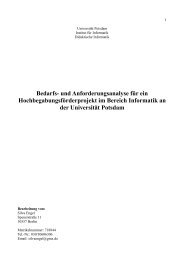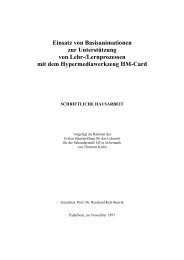Maria Knobelsdorf, University of Dortmund, Germany - Didaktik der ...
Maria Knobelsdorf, University of Dortmund, Germany - Didaktik der ...
Maria Knobelsdorf, University of Dortmund, Germany - Didaktik der ...
You also want an ePaper? Increase the reach of your titles
YUMPU automatically turns print PDFs into web optimized ePapers that Google loves.
Abenteuer Informatik – Hands-on exhibits for learning<br />
about computational thinking<br />
Dr. Jens Gallenbacher<br />
<strong>Didaktik</strong> <strong>der</strong> Informatik,<br />
Technische Universität Darmstadt<br />
Hochschulstr. 10<br />
64289 Darmstadt<br />
+49 6151 16-2573<br />
jg@di.tu-darmstadt.de<br />
Abstract<br />
Computational thinking is one <strong>of</strong> the pillars <strong>of</strong> the ACM-CSTA<br />
standards for teaching computer science from kin<strong>der</strong>garten to<br />
college. Our approaches Abenteuer Informatik – Informatik<br />
begreifen (adventures in informatics – hands on computer<br />
science) and Abenteuer Technik are well established in the<br />
german-speaking community as means to connect computer<br />
science with other subjects and as means <strong>of</strong> clarifying some<br />
prejudices against computer science, especially problematic for<br />
establishing computer science as subject in schools.<br />
Categories and Subject Descriptors<br />
K.3.2 [Computer and Information Science Education]:<br />
Curriculum<br />
General Terms<br />
Human Factors<br />
Keywords<br />
Computational thinking, curriculum, computer science education,<br />
Abenteuer Informatik, computer science unplugged<br />
1. Introduction<br />
Since the invention <strong>of</strong> commercial electronic computers in the<br />
middle <strong>of</strong> the last century the public perception <strong>of</strong> relevant<br />
aptitudes for computer-users shifted continuously: From<br />
scientificly trained expert over the well-informed programmer to<br />
the "just"-user today. In the same manner the computer-science<br />
education in schools changed.<br />
While in the beginning it has been obligatory to learn basics <strong>of</strong><br />
computer-technology and programming, because standardapplications<br />
were not available or to expensive for schools,<br />
today's focus <strong>of</strong> cs-education <strong>of</strong>ten is computer literacy, like the<br />
curriculum for european computer driving licence.<br />
The stereotypic public and political opinion about computer<br />
science also changed radically: On one hand the search for the<br />
correct buttons in <strong>of</strong>fice, on the other hand a cryptic science, that<br />
is everything about Devices and nothing about humans.<br />
Since 2006 Jeannette M. Wing, Pr<strong>of</strong>essor at CMU, gives<br />
distinction to the term "computational thinking" and elaborated,<br />
that computer science is not the science about computers. It<br />
particularly produces concepts <strong>of</strong> (human) thinking, that amongst<br />
others may be used to program machines, but mostly benefit other<br />
155<br />
sciences and dayly use. In short, Wing proved computer science<br />
provides general education (in europe <strong>of</strong>ten stated by the german<br />
term "allgemeinbildend"). She legitimized "true" computer<br />
science as subject in general schools, so computational thinking is<br />
positioned prominently in the standards <strong>of</strong> the CSTA and in the<br />
proposal for a computer science curriculum in Great Britain,<br />
which are likely to be implemented by many schools.<br />
Adventures in informatics – hands on computer science is a very<br />
practical approach with similar goals. The book [Gallenbacher<br />
2012] is sold over 10.000 times and in the exhibition over<br />
100.000 people played, puzzled to get their hands on computer<br />
science at 31 different locations, amongst others ars electronica<br />
center in Linz and Heinz Nixdorf Forum in Pa<strong>der</strong>born. It<br />
fascinated kids as well as their grandparents and many politicians.<br />
Reason enough to evaluate, how both approached could benefit<br />
from each other.<br />
2. Computational Thinking<br />
Wing describes “Computational Thinking is the thought<br />
processes involved in formulating problems and their solutions so<br />
that the solutions are represented in a form that can be effectively<br />
carried out by an information-processing agent Informally,<br />
computational thinking describes the mental activity in<br />
formulating a problem to admit a computational solution. The<br />
solution can be carried out by a human or machine, or more<br />
generally, by combinations <strong>of</strong> humans and machines.” [Wing<br />
2010]<br />
A position paper published by the german “Gesellschaft für<br />
Informatik” [Biundo 2006] states the situation in a very similar<br />
way.<br />
3. Abenteuer Informatik, Abenteuer Technik<br />
and Computational Thinking<br />
Abenteuer Informatik as concept to teach computer science<br />
without computers provides many approaches for teaching<br />
computer science with focus on computational thinking. The full<br />
exhibits referenced by the examples in this chapter may be<br />
downloaded from www.abenteuer-informatik.de - most <strong>of</strong> them<br />
are available in german, english and spanish language.


